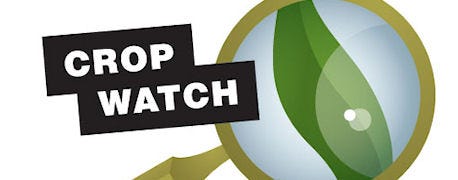
Unless they're hiding in some far corner of the field, we haven't run across weeds in the Crop Watch '14 field so far. The herbicides applied to control weeds in the Crop Watch '14 field appear to be holding their own. Residual herbicides sometimes run out of gas about this time in the season, especially with the rain that has fallen on the field.
We'll let you know if weeds, including grass escapes, show up later. So far, so good on weed control.
Crop Watch 7/7: Does The Corn Field Have Enough Plants?

Crop Watch 2014: Weed pressure shouldn't be an issue this year.
That's not always the case. One year ago in the Crop Watch field in a different location, there were a few, yet noticeable weed escapes. The biggest problem was grass on one set of end rows. Since the end rows were very long and there were lots of them, it actually dinged the yield a bit. Soil compaction was one of the factors blamed for poor weed control in that case.
There are weeds in the open grass area surrounding this year's Crop Watch field, so there is likely wed pressure there. But Palmer amaranth has not appeared in this area yet. We've seen it almost as tall as the corn in northwest Indiana where it is threatening to get out of control.
Crop Watch 7/4: Corn Field Varies in How Fast Canopy Closes the Rows
Clean and green: There are weeds outside the field, but so far weeds are not an issue in the Crop Watch '14 field.
Not so in this field. In fact, no Palmer amaranth has been reported in the county where this field is located. Weed scientists urge anyone who finds a plant they suspect to be Palmer amaranth to send it in for certain identification. Because even one plant can produce lots of seeds, populations can build quickly. Once it is in an area, recommendations for certain residual herbicides can hold it in check. If you're still into post programs instead, you may want to alter your program if and when Palmer amaranth is confirmed to be in the area. It's a tough customer to deal with, weed scientists say.
About the Author(s)
You May Also Like




